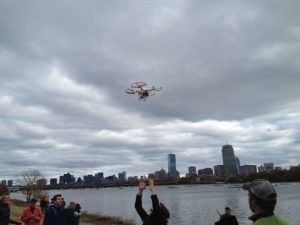
News and Commentary. The National League of Cities (NLC) today announced the release of Cities and Drones, a report designed to give local governments “insight” on FAA regulations. More importantly, the report “provides suggestions” (and even templates) for local drone ordinances, encouraging more local drone regulation.
The report is another disturbing indication that the FAA has failed to take a firm stand on drone regulation, and that the “patchwork quilt“of regulations that they tried to avoid is rapidly spreading out of their control.
The NLC report does give a nod to encouraging drone business and innovation – but its message is clear; cities and towns should be passing more laws. “This report serves as a primer on drones for local officials,” said National League of Cities (NLC) CEO and Executive Director Clarence E. Anthony. “Whether they are revolutionizing search and rescue capabilities or helping realtors show off their homes, drones are lowering the cost and increasing the reach of airborne services. As our skies are becoming more crowded, cities must be able to decide how and when they want to see drones used in their communities.”
The report outlines exactly what can and cannot be regulated, and recommends that local governments move to enact laws limiting where and how drones can be used in their communities. “…drones also present challenges,” the report says. “There are some safety issues… The FAA’s final rule on drones left some opportunity for city governments to legislate on this issue. Rather than ban them outright, city officials should consider how this new technology might serve residents or enhance city services.”
While seeming to acknowledge the FAA’s “Fact Sheet,” stating that the FAA is the ultimate authority on drone law, the report interprets the fact sheet and the wording of Part 107 in terms of the loopholes, concluding that “local authority is not generally preempted.”
In Part 107, the FAA acknowledges the authority of state and local officials to pass laws that may touch upon drone operations, noting “laws traditionally related to state and local police power—including land use, zoning, privacy, trespass, and law enforcement operations—generally are not subject to Federal regulation.” Moreover, when it comes to regulating “flight altitude, flight paths; operational bans; or any regulation of the navigable airspace” the FAA did not indicate laws are preempted, rather the agency said “consultation with FAA is recommended.”
Unfortunately for the drone industry, this may be true. While the FAA has tried to discourage local drone laws, they have not moved quickly enough to make federal legislation clear, and that has left room for local governments to put in their own regulations. This is bad news for the growth of the drone industry, which may find business hindered by the need to learn – and follow – a new set of regulations in each town.
Miriam McNabb is the Editor-in-Chief of DRONELIFE and CEO of JobForDrones, a professional drone services marketplace, and a fascinated observer of the emerging drone industry and the regulatory environment for drones. Miriam has penned over 3,000 articles focused on the commercial drone space and is an international speaker and recognized figure in the industry. Miriam has a degree from the University of Chicago and over 20 years of experience in high tech sales and marketing for new technologies.
For drone industry consulting or writing, Email Miriam.
TWITTER:@spaldingbarker
Subscribe to DroneLife here.